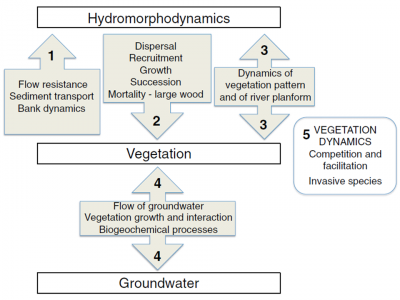Difference between revisions of "Category:Vegetation Models"
m (→Modelling Vegetation-Hydromorphology Interactions) |
m |
||
| (12 intermediate revisions by 2 users not shown) | |||
| Line 3: | Line 3: | ||
=Modelling Vegetation-Hydromorphology Interactions= | =Modelling Vegetation-Hydromorphology Interactions= | ||
| − | + | Here is summarised a review of modelling approaches that can help to investigate aspects of the interaction between plants and physical processes in river environments (see also [[Role_of_vegetation|Role of vegetation]]). Models can support river managers in the management, design and restoration of rivers. The content is taken from Gurnell et al. (2014) (see also Solari et al. 2015). | |
Models have been distinguished according to the following topics (Figure 1): | Models have been distinguished according to the following topics (Figure 1): | ||
| − | (i) Effect of vegetation on | + | (i) [[Effect of vegetation on hydromorphodynamics]]. This includes the more complex models generally including advanced hydrology and sediment transport and simple vegetation which are mainly used for engineering purposes. It includes equations and process descriptions for flow resistance, bank erosion and bank accretion. |
| − | (ii) Effect of hydromorphology on vegetation. This includes ecological models using hydromorphodynamics as environmental variables influencing plant survival, growth, reproduction and dispersal. | + | (ii) [[Effect of hydromorphology on riparian vegetation]]. This includes ecological models using hydromorphodynamics as environmental variables influencing plant survival, growth, reproduction and dispersal. |
(iii) Large wood. This includes models of breakage, transport and decomposition of large wood. | (iii) Large wood. This includes models of breakage, transport and decomposition of large wood. | ||
| Line 19: | Line 19: | ||
(vi) Interaction between groundwater and vegetation. This includes ecohydrological models with vegetation dynamics. | (vi) Interaction between groundwater and vegetation. This includes ecohydrological models with vegetation dynamics. | ||
| − | [[File:VegHymoInteractions_models_Fig1.png|center|thumb|400px| Figure 1. Interactions between vegetation and hydromorphology.]] | + | [[File:VegHymoInteractions_models_Fig1.png|center|thumb|400px| Figure 1. Interactions between vegetation and hydromorphology. Extracted from Solari et al. (2015).]] |
| − | For each topic are | + | For each topic are reported: |
| + | |||
- the usability of the tools for the analysis of hydromorphological pressures and design of restoration measures; | - the usability of the tools for the analysis of hydromorphological pressures and design of restoration measures; | ||
| + | |||
- future research and modelling challenges. | - future research and modelling challenges. | ||
==References== | ==References== | ||
| − | [http://www.reformrivers.eu/system/files/2.2%20Natural%20HyMo%20Biota%20Ecol%20Function%20part%201%20FINAL.pdf | + | Gurnell A.M., González Del Tánago M., O’Hare M.T., Van Oorschot M., Belletti B., Buijse T., García De Jalón D., Grabowski R., Hendriks D., Mountford O., Rinaldi M., Solari L., Szewczyk M., Vargas-Luna A. (2014). Influence of Natural Hydromorphological Dynamics on Biota and Ecosystem Function. [http://www.reformrivers.eu/system/files/2.2%20Natural%20HyMo%20Biota%20Ecol%20Function%20part%201%20FINAL.pdf REFORM Deliverable 2.2 Part 1, Section 2.3] |
| − | Solari L., Van Oorschot M., Belletti B., Hebdrix D., Rinaldi M., Vargas-Luna A. (2015). Advances on modelling riparian vegetation-hydromorphology interactions. River Research and Applications. | + | [http://doi.org/DOI:10.1002/rra.2910 Solari L., Van Oorschot M., Belletti B., Hebdrix D., Rinaldi M., Vargas-Luna A. (2015). Advances on modelling riparian vegetation-hydromorphology interactions. River Research and Applications.] |
Latest revision as of 07:25, 29 September 2015
Modelling Vegetation-Hydromorphology Interactions
Here is summarised a review of modelling approaches that can help to investigate aspects of the interaction between plants and physical processes in river environments (see also Role of vegetation). Models can support river managers in the management, design and restoration of rivers. The content is taken from Gurnell et al. (2014) (see also Solari et al. 2015).
Models have been distinguished according to the following topics (Figure 1):
(i) Effect of vegetation on hydromorphodynamics. This includes the more complex models generally including advanced hydrology and sediment transport and simple vegetation which are mainly used for engineering purposes. It includes equations and process descriptions for flow resistance, bank erosion and bank accretion.
(ii) Effect of hydromorphology on riparian vegetation. This includes ecological models using hydromorphodynamics as environmental variables influencing plant survival, growth, reproduction and dispersal.
(iii) Large wood. This includes models of breakage, transport and decomposition of large wood.
(iv) Interaction between vegetation and hydromorphology. This includes several models explicitly including the interaction between vegetation and hydromorphology (topics i and ii combined).
(v) Vegetation dynamics. This includes models that simulate interactions between plants and predict vegetation patterns in less disturbed environments (e.g. at higher altitudes on the floodplain) as a result of competition and facilitation processes.
(vi) Interaction between groundwater and vegetation. This includes ecohydrological models with vegetation dynamics.
For each topic are reported:
- the usability of the tools for the analysis of hydromorphological pressures and design of restoration measures;
- future research and modelling challenges.
References
Gurnell A.M., González Del Tánago M., O’Hare M.T., Van Oorschot M., Belletti B., Buijse T., García De Jalón D., Grabowski R., Hendriks D., Mountford O., Rinaldi M., Solari L., Szewczyk M., Vargas-Luna A. (2014). Influence of Natural Hydromorphological Dynamics on Biota and Ecosystem Function. REFORM Deliverable 2.2 Part 1, Section 2.3
Pages in category "Vegetation Models"
The following 2 pages are in this category, out of 2 total.
